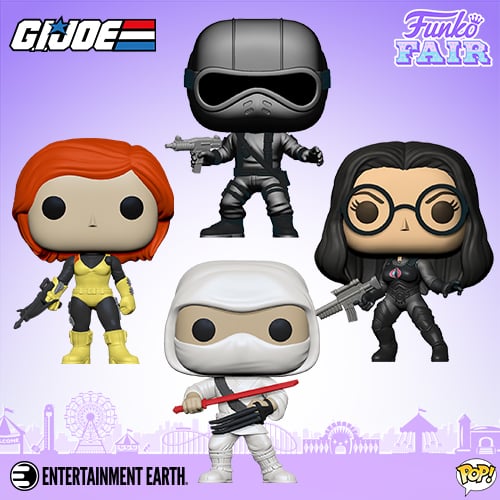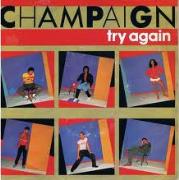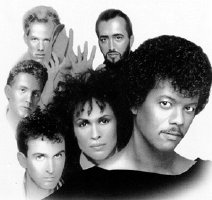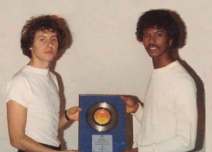(This interview was originally published March 29, 2013 on the now-retired Kickin' it Old School blog. It is one installment in an incredible series of interviews we are republishing on Rediscover the '80s for posterity and your enjoyment. These are more than just interviews in a way; they are more like '80s timelines or oral histories on their respective subject matters. Please keep in mind the original date because some content could be specific to the time of the interview, though the majority should be timeless and totally rad.)
When the opportunity presents itself to ask a few questions to someone who contributed to the awesomeness of the '80s, I will continue to share those answers with you right here. Again, lucky for me (and hopefully you), I do get to share a little more awesomeness with you.
This time that awesomeness is Pauli Carman. He is the lead vocalist for the band Champaign (named after their hometown in Illinois). His smooth vocals highlight the band’s two biggest hit songs, “How ‘Bout Us” and “Try Again“. These singles not only had success on the R&B and Adult Contemporary charts, but crossed over to have success on the pop chart and radio airplay. You will find out a little about him, Champaign, those hit songs and more as we get on to some selections from my interview with Pauli Carman…
Q: When did you know you wanted to be a professional musician? When and how did you get your own start in the music industry? Please tell us a little about what you did earlier in your career before Champaign.
Pauli: I knew I wanted to be on stage and performing in front of an audience at the early age of 12 in Junior High School. I was in the play The King and I and I received a standing ovation and got the bug, felt the power of communicating a performance to an audience and the power of love from an audience back to me. I was hooked. The following year I started my first band “The JR. Flames” named after James Brown and “The Famous Flames”. It seems I’ve always had a band and music has always been my passion. My first album, Thirsty or Not… Choose Your Flavor, with the group “Coalkitchen” on the Full Moon/Epic label was in 1977. The label was owned by record industry mogul Irving Azoff.
Q: Please discuss any of your personal musical influences and who molded and inspired the artist you were especially back in the '80s.
Pauli: I’ve always had a broad spectrum of musical influences from growing up in a large family of seven boys and three girls and only two were younger brothers and one younger sister. I was mainly influenced by what my mother and father and older siblings listened to. My mother started each morning playing Gospel music in our home, so every morning we could hear Mahalia Jackson, James Cleveland and Aretha Franklin. Every Sunday after church my Dad loved Jazz; Sunday afternoon was Jazz day, everything from Jack McDuff, Oscar Peterson, Dizzy Gillespie and more. My brothers and sisters would listen to everything Motown and my personal taste was anything from the Rolling Stones, Jimi Hendrix, Sly & The Family Stone, Marvin Gaye, Crosby, Stills & Nash.
Q: Then when and how did Champaign actually come to be? Who came up with the band’s name and what inspired it?
Pauli: Prior to the group becoming “Champaign”, I had a group called “Champagne” [spelled like the sparkling beverage, not the city in Illinois] which had evolved from a former group called “Coalkitchen” which Mike Day and Dana Walden and I had been recording in the studio with. After Coalkitchen broke up, I started that group called “Champagne” with other musicians. Then after that group broke up, Dana and Mike and I decided to start recording together again. We had a wild notion to start another band again that would play the club circuit and also reach for a recording contract with a major label. So we hired other musicians, Rocky Maffit, Rena Jones and Leon Reeder, who had played with Dana in the Water Brothers Band. We decided we needed a name and I suggested “Champagne” and did not get any positive response. So I suggested we spell it like the city this time… and everyone agreed.
Q: Champaign had its biggest hit with “How ‘Bout Us” in 1981. I never knew that this was actually a re-recorded version of the 1975 original. Please take us through the evolution of this song. What changed from the original Water Brothers Band version when Champaign recorded it six years later?
Pauli: I am not aware that this song was recorded in 1975 or if it was ever recorded prior to 1981… although I am aware that the song in a different form had been performed in local clubs in the Midwest area by a group called the Water Brothers for which Dana Walden was the keyboard player. When Dana brought the demo of the song to me it had a very Country/Pop feel to it and he and I revised the song to more of an R&B/Pop flavor to fit my voice and the band’s fan base appeal.
“How ‘Bout Us” was released by Champaign as a single in January of 1981. It was written by keyboardist Dana Walden and had been recorded in 1975 by the Water Brothers Band which he was part of at that time, though it went mostly unnoticed. It wasn’t until they put a little R&B feel to it and Carman laid down his silky smooth vocals that the song took off. Shocking to me, it turns out that producer Leo Graham actually had to fight to have Carman keep lead vocals on this song. The single spent 23 weeks on the Billboard Hot 100 peaking at #12 in the June of 1981. It also went on to spend two weeks on top of the Adult Contemporary chart. Here is the music video for “How ‘Bout Us” by Champaign…
Q: Did you have any feeling when Champaign recorded and released it that the single was going to be something special or have the success that it did?
Pauli: I had hoped that the song “How ‘Bout Us” would at least obtain and solidify a recording contract with a major label, because at the time it was only one of many songs that were submitted to a number of major record labels. So when CBS Columbia agreed to release “How ‘Bout Us” as a single it was very exciting and then they decided to do an album deal with us.
Q: What are your feelings about “How ‘Bout Us” now over 30 years later?
Pauli: After 30 years, I think I love this song more now than ever. It has taken me places around the world that I never dreamed I’d ever see. The night I recorded the lead vocal on “How ‘Bout Us”, John Lennon was murdered [December 8, 1980]… not a good remembrance but just true. I am so blessed to have been a part of the making of such a wonderful classic.
Q: Then in 1983 you had another hit with “Try Again”. What can you share with us regarding how this song was conceived and created? What are your feelings about the song now about 30 years later?
Pauli: When I first heard the demo for the song “Try Again”, it was an absolute Country song (not that I don’t like Country music because I do). So I set out with Dana Walden and together we proceeded to mold the song into more of a Pop/R&B flavor just as we had done with “How ‘Bout Us”. I loved it. We recorded “Try Again” under the direction and production of George Massenburg who is a world renowned innovator in sound and recording techniques. It was an absolute pleasure to work with him, as it was to work with Leo Graham on “How ‘Bout Us”. George Massenburg had at that time produced records for Linda Ronstadt, Little Feat, Earth Wind & Fire, Journey, Billy Joel, and the list goes on. I must admit 30 years later I still love the song and very much enjoy performing the song live.
“Try Again” has long been a favorite of mine. I love the blend of Carman and Rena Jones singing as well as the combination of regret and optimism in the lyrics. Songwriting credits have gone to Dana Walden again joined by Rocky Maffit and Michael Day, but it’s the vocals that really make this song for me. It was released as a single in March of 1983 and reached the top 10 of the R&B chart while peaking at #23 on the Billboard Hot 100. Here is the music video for “Try Again” by Champaign…
Q: Your third album [Woman in Flames in 1984] did not achieve the same pop success of your debut album or even your second album. Though you had some additional success on the R&B charts, Champaign did not have another pop hit after “Try Again”. Do you have any ideas why you were not able to find another hit in the late-80s or after?
Pauli: I think that Champaign did not achieve chart topping success with the third album because there were egos within the band that did not want to listen to the guidance and advice from our record company and were insistent upon handling production chores and video direction on their own which led to unprofessional mistakes in final product. Such as overproduction, not sticking to a musical formula that was not broken, instead trying to tap into genres of Rock on some songs and on other songs sticking to the original Champaign formula. On the only video (“Off and On Love”), minor errors that were overlooked but also vitally important (such as lighting) caused it not to receive the notoriety and attention that it could have from not only critics but also our public fan base.Carman left Champaign temporarily in 1985 to pursue a solo career. In 1990, he reunited with the rest of Champaign to record their fourth studio album released in 1991. Since 2008, Pauli Carman continues to tour and record new music as Champaign but with none of the other original musicians.
Q: What lasting impact do you feel music from the '80s has made?
Pauli: It seems to me that there’s a sort of resurgence of music from the '80s happening now or should I say a new appreciation for that exciting era in music that was happening then… from the warm sound of analog recording to the conscious awareness of soulful lyrics and funky rhythms without vulgarity from all genres of music.
Q: Please tell us a little about where your music career has taken you since the '80s. How have your priorities or goals changed over the years?
Pauli: Since the '80s, my musical career has taken me all over the world. I’ve had a chance to perform and experience audiences in many different countries, have interacted with many fans of different nationalities and cultures and have been so blessed to be graciously received from Europe to the Far East. Music is truly universal and also a healing aspect of life. My priorities have always been to bring the best of my abilities in whatever I do to the public and fans around the world, musically and otherwise. It’s my responsibility to try to keep quality and integrity in our music as well as creativity in whatever it is Pauli Carman & Champaign bring to the public.
Q: What are some of your proudest professional accomplishments?
Pauli: As far as my proudest professional accomplishments, there are many and I think the best is still yet to come. But I can say that I feel very proud and blessed that, after 30 years, Champaign is still recognized in the music industry today as having classic unforgettable, everlasting melodies that are still being heard around the world everyday on radio rotation.
Q: After over four decades in the business, from your perspective, how has the music industry changed over that time? Have any of the changes been for the better? And how you see the future?
Pauli: The music industry has changed drastically and, to my knowledge, this all started at the end of the '80s with the onset of more small Indie labels, internet record sales, digital downloads, original music sampling, the demise of analog recording and the demise of major labels, etc. (I could go on). As for myself, music has always been and always will be a lifestyle therefore it’s my passion. I find new ways of expressing myself through various art forms within the industry. This includes any possible way of communicating my art to the public and Champaign fan base whether it’s doing The Pauli Carman Show where I’m interviewing other artists or recording music for a cause (such as Muzart or Mercy for the Gulf). This to me is my meaning of success in an industry that has drastically changed. As for the future I keep my sunglasses close, because I see a very positive and bright future for Pauli Carman & Champaign.
Q: What else is Pauli Carman up to nowadays? Musically and otherwise? What can we expect in the future? Any remaining ambitions or regrets?
Pauli: Musically, I try to consistently stay in the studio recording new music and various other projects. This includes doing voice overs for “Champaign – The Kind – The Real Story” which is a collection of stories and anecdotes from my music career, both on and off stage. I have a production company in Las Vegas which handles all of The New Media Content that is being published via internet and all other media outlets (TV, movies, radio, etc.). What you can expect from Pauli Carman & Champaign is more wonderful, classy, Champaign music and anything pertaining to the Arts, in the form of stage plays, movie roles, live music performances and continuing to follow my passion in the entertainment industry. When it comes to regrets, we’re speaking of the past…and I think it’s only fair to state that everyone has probably learned one thing or another by a mistake that they made in hindsight. Though I’ve never considered myself a know-it-all, there are a few things I would have done differently but I feel I’ve seasoned pretty well. So, that being said, no regrets. Live for today, have faith in the future, put God first and stay one with the Universe.
I am pleased that Pauli was able to take some time to answer some questions so I could share them with you here. You can find out more about “The Kind” and keep up with Champaign at the official website – ChampaignBand.com. It’s not what you think of as stereotypical '80s music, but it came out in the early-80s and is some darn good R&B music. I want to take this occasion to again thank Pauli Carman for his contributions to '80s pop culture especially through those Champaign hit songs and, even more, for going back to the '80s with us here for a little while as well.
Follow @OldSchool80s on Twitter for a daily dose of '80s nostalgia and read more Retro Interviews on RD80s.

 shareasale.com
shareasale.com StickerShoppe.com
StickerShoppe.com













 Elfi Santa
Elfi Santa

0 Comments